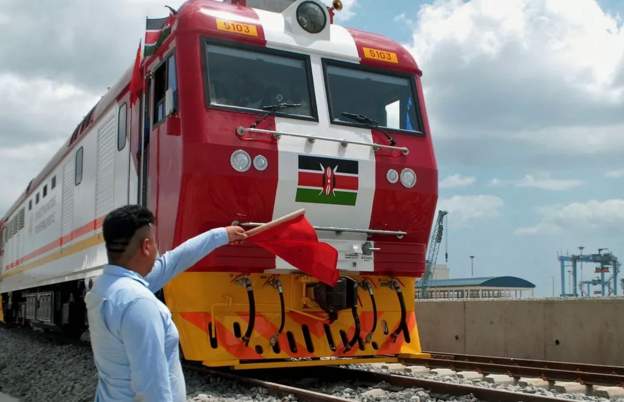The Kenyan government finally made public details of some of the loan agreements it signed with China’s Export and Import (Exim) Bank for the funding of the country’s most expensive infrastructure project – the Standard Gauge Railway (SGR).
The country borrowed about $5bn (£4.3bn) from Chinese lenders to develop the 700km (435 miles) railway line which runs from the coastal city Mombasa to the central Naivasha town.
The 480km section between Mombasa and Nairobi cost $3.6bn (disbursed in tranches of $2bn and $1.4bn in 2014) before Kenya borrowed $1.4bn more in December 2015 for the 120km section between Nairobi and Naivasha.
The project has however been rocked by concerns about its economic viability, claims of inflation of project costs, corruption and a skewed contract that allegedly put Kenya’s strategic assets at risk of being seized by the Chinese government should the country default on the loan repayment.
Why has the contract been kept secret for so long?Despite mounting public pressure and a court order directing the government to disclose details of the contract, former President Uhuru Kenyatta’s administration declined to make it public.
The signed loan deal obliges the Kenyan government to keep the terms of the of deal “strictly confidential”.Are Kenya’s strategic assets at risk in case of defaults on the loan?According to clause 5.5 of the Preferential Buyer Credit Loan agreement, neither the borrower (Kenya) nor any of its assets “would be entitled to any right of immunity on the grounds of sovereignty or otherwise from arbitration, suit, execution or any other legal process”
.Kenyan authorities have previously denied claims that the country’s assets such as the port of Mombasa had been attached as collateral and were at risk of being seized by China in case of a default.
Were the dispute resolution terms skewed in favour of China?China has control over dispute adjudication.
The contracts stipulates that disputes arising from the deal would only be arbitrated by the China International Economic and Trade Arbitration Committee(CIETAC) and the arbitral award would be final.
The arbitration would strictly take place in Beijing.“The borrower also agrees that the arbitral award against it made by such tribunal shall be final and conclusive and may be enforced in any other jurisdiction,” clause 15(4) of the agreement reads.
